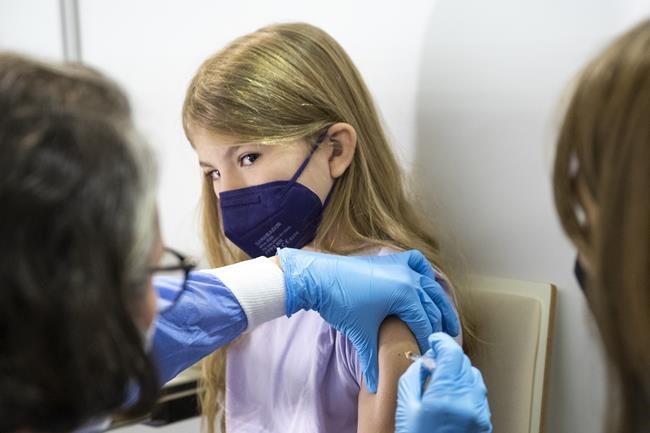Parents were learning Monday how soon their younger children could get an appointment for a COVID-19 shot as shipments of the pediatric Pfizer-BioNTech vaccine made their way across the country.
Ontario parents heard they could start making appointments for eligible kids ages five to 11 starting Tuesday. Doses were expected to be administered as early as Thursday, the province said.
“Offering the protection of the vaccine to children aged five to 11 is a significant milestone in Ontario’s fight against COVID-19 in advance of the holiday season," Health Minister Christine Elliott said.
The province said about one million children will be eligible.
It expects to get 1,076,000 doses from the federal government. Just over 400,000 were to arrive Monday.
One-third of new COVID-19 cases in Ontario are in school-aged children.
The Public Health Agency of Canada said earlier this month that children under 12 account for the highest rate of new COVID-19 infections.
Parents in the Prairie provinces were eager to book vaccinations for their children after months of increasing infections and extreme pressure on health care earlier this fall.
More than 15,000 appointments were made in Manitoba by Monday afternoon, only a few hours after they became available. There are about 125,000 children who are eligible and doses were expected to start going into arms by the end of the week.
"These vaccines can't come soon enough," said Dr. Marcia Anderson, medical lead for the Manitoba First Nations pandemic response team. She said enough vaccines for about 15,000 children were to be shipped to First Nations later this week.
Saskatchewan was expecting about 112,000 doses to be delivered Tuesday — nearly enough for the 115,000 children in the province who are eligible. Vaccinations, expected to start the next day, are to be available at community clinics, schools and pharmacies.
The province was hit hard by the pandemic's fourth wave with surging cases and hospitalizations. Some COVID-19 patients were transferred out of province for treatment as intensive-care units became overwhelmed.
Infections have begun to stabilize, but Saskatchewan Health Minister Paul Merriman said the arrival of vaccines for younger children will provide more protection.
"The immunization of this age cohort will also help to reduce transmission of the virus and ensure that children can continue to enjoy their friends and activities," Merriman said in a statement.
Alberta Premier Jason Kenney encouraged parents to get their young children immunized. Vaccines were to start arriving in the province Monday and kids were expected to get a jab later this week.
Alberta opened online pre-registration of children for vaccines in October. More than 390,000 youngsters will be eligible for shots.
Kenney defended his government's plan to administer the vaccine through clinics. He said few students got shots on school sites when the vaccine was offered to older youth.
The Pfizer vaccine was previously authorized for anyone 16 years and older and, in May, it was approved for those 12 and up. The pediatric version for children between five and 11 is a smaller dose, which officials say is common in all types of vaccines for children.
Many provinces have said they are ensuring their vaccine rollout plan is kid-friendly, with more time to give doses in quieter spaces and cubicles or family pods, so parents can give support.
Most have said they expect to be administering doses to children by the end of the week.
Quebec Premier François Legault said his government would provide plans Tuesday. Officials previously said the goal was to administer one dose to the roughly 700,000 eligible children by Christmas.
The fourth wave is having a greater effect on children because they've been unable to get vaccinated, said the Council of Chief Medical Officers of Health.
Kids have also felt the significant impact of school closures and activity cancellations forced by the pandemic, the group said in a statement.
"With pediatric vaccination, we now have an option for added protection for school-aged children from COVID-19," it said.
"Along with continuing to practice individual public-health measures, this option can help them to safely participate in the activities that matter most."
This report by The Canadian Press was first published Nov. 22, 2021.
— With files from Steve Lambert and Brittany Hobson in Winnipeg and Dean Bennett in Edmonton
Kelly Geraldine Malone, The Canadian Press


